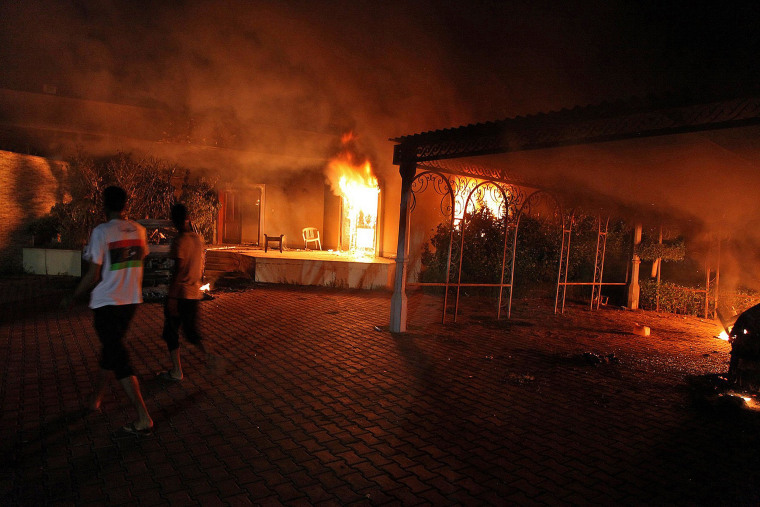U.S. special forces seized the suspected mastermind of the deadly Benghazi consulate attack in a weekend raid in Libya, U.S. officials said Tuesday.
Ahmed Abu Khattala has been wanted in the assault that killed Ambassador Chris Stevens and three other Americans since shortly after the Sept. 11, 2012, attack. His capture marks the first apprehension of one of the alleged perpetrators in the attack.
Sign up for breaking news alerts from NBC News
"It's important for us to send a message to the world that when Americans are attacked, no matter how long it takes, we will find and bring those to justice," President Barack Obama said Tuesday. "I want to make sure that everybody around the world hears that message very clearly. Because my first and most solemn duty as president and commander-in-chief is to keep the American people safe."
Khattala was captured late Sunday by Special Operations forces at a beach resort in Libya and was flown to the USS New York, the amphibious transport dock ship built with steel from the World Trade Center towers, U.S. officials told NBC News. They would not confirm whether he was still on the ship. There were no casualties in the secret weekend raid, U.S. officials said.
According to one senior official, "There may be other shoes to drop."

Khattala told Reuters in an interview in October 2012 that he had heard he was a suspect only through media reports and was surprised that officials had told journalists he was at large.
"These reports say that no one knows where I am and that I am hiding," he said. "But here I am in the open, sitting in a hotel with you. I'm even going to pick up my sister's kids from school soon."
The militia commander acknowledged he was present during the incident but said he was not one of the ringleaders.
Khattala, a senior leader of the Benghazi branch of terror group Ansar al-Sharia in Libya, is being held in a secure location, a U.S. official said. One official said the U.S. effort to snag Khattala was aided by the fact that he is persona non grata with the current Libyan government.
"He was on the run from both us and them," the official said.
He will be tried in U.S. court — most likely in Washington, D.C. — and is currently being interrogated by FBI officials. He faces charges of killing a person in the course of an attack on a federal facility, providing material support to terrorists that result in death, and using a firearm in relation to a crime of violence.
The charges carry a maximum penalty of death. Obama said Tuesday that Khattala was being transported back to the U.S. after U.S. special forces showed "incredible courage and precision" capturing him.
Besides Ambassador Stevens, the attack killed State Department security official Sean Smith and CIA contractors Tyrone S. Woods and Glen Doherty.
The U.S. had filed charges against Khattala and others last year, but no arrests were made until now, prompting strong criticism against the Obama administration from Republicans.
Sen. Kelly Ayotte, R-New Hampshire, expressed gratitude Tuesday to military and intelligence officials who helped capture Khattala but said the administration should not be "rushing to read him his Miranda rights."
"I hope the administration will focus on collecting the intelligence necessary to prevent future attacks and to find other terrorists responsible for the Benghazi attacks," she said.
Attorney General Eric Holder said Khatalla's arrest "proves that the U.S. government will expend any effort necessary to pursue terrorists who harm our citizens."
Caitlin Hayden, a spokeswoman for the National Security Council, said Khatalla would be tried in the federal civilian court system, not sent to the U.S. detention facility at Guantanamo Bay, Cuba, because "the administration's policy is clear on this issue: We are seeking to close Guantanamo, not add to its population."